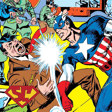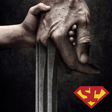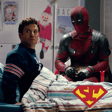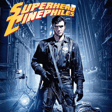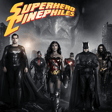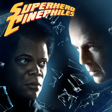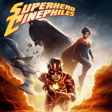Become a Creator today!Start creating today - Share your story with the world!
Start for free
00:00:00
00:00:01

Captain America: The Winter Soldier
Author Bobby Nash joins the podcast to discuss what many consider to be the crown jewel of the MCU—Captain America: The Winter Soldier. As to be expected with two writers, we dive deep into the characterization aspects of this film and the heavy themes it deals with that are even more relevant today than when this movie came out.
---
Send in a voice message: https://anchor.fm/superherocinephiles/message
Recommended
Transcript
Introduction to Audible and its offerings
00:00:00
Speaker
Hey, fellow superhero cenophiles. Did you know that almost 30% of adults say they haven't read a book in the past year? Primary reason why is a lack of time. Well, Audible's here to help with the gift of found time. Thanks to Audible, you can listen to audiobooks like Marvel Comics, The Untold Story, or Slugfest inside the epic 50-year battle between Marvel and DC.
00:00:19
Speaker
Read up on the history of superheroes in comics and movies with Grant Morrison's Supergods. You can also check out Vanguard, my original superhero novel series, or try The Vrilagenda or The Adventures of Fortune McCall, both of which were written by our duly departed host emeritus, Derek Ferguson.
00:00:35
Speaker
Whatever you're looking for, Audible has thousands of titles that you can consume while commuting, exercising, cooking, or just relaxing at home. And not only audiobooks, an Audible membership also gives you access to tons of content like podcasts, theatrical performances, and exclusive Audible originals that you won't find anywhere else. To give you a taste of what you can get, Audible is partnered with this show to provide listeners with a free 30-day trial.
00:00:59
Speaker
All you have to do is go to audibletrial.com slash SuperCinemapod and with your free trial you get one free audiobook and two free Audible Originals. In fact, you get to keep those titles even if you cancel before the trial is over. So what are you waiting for? Head on over to audibletrial.com slash SuperCinemapod and start your free trial today.
Exploring Project Insight's ethical dilemmas
00:01:31
Speaker
This is Project Insight. Three next-generation helicarriers synced to a network of targeting satellites. Launch middle of Marion Stark. Once we get them in the air, they never need to come down. Continuous suborbital flight courtesy of our new repulsor engines. Stark? He had a few suggestions once he got an up-close look at our old turbines.
00:01:56
Speaker
These new long-range precision guns can eliminate a thousand hostiles a minute. The satellites can read a terrorist DNA before he steps outside his spider hole. We're gonna neutralize a lot of threats before they even happen. Thought the punishment usually came after the crime. We can't afford to wait that long. Who's we? After New York, I convinced the World Security Council we needed a quantum surge in threat analysis. For once, we're way ahead of the curve. By holding a gun to everyone on Earth, you're calling it protection.
00:02:27
Speaker
You know I read those SSR files. Greatest generation? You guys did some nasty stuff. Yeah. We compromised, sometimes in ways that made us not sleep so well. But we did it so that people could be free. This isn't freedom. This is fear. S.H.I.E.L. takes the world as it is, not as we'd like it to be. And it's getting damn near past time for you to get with that program, Cap. Don't hold your breath.
Guest introduction: Bobby Nash
00:02:53
Speaker
Welcome to the Superhero Cinephiles Podcast. I'm your host, Barry Constantine. And today I'd like to welcome a guest of the show, a guy I've known for a few years now, who's also been a longtime listener of the show.
Bobby Nash's writing career
00:03:05
Speaker
I've actually done a few other podcasts with him before in the past. He's been a guest on a few shows I've done in the past. And that's Bobby Nash. Bobby, how you doing today? I am wonderful. Thank you so much for having me. Well, thanks for agreeing to come on. Before we get started, why don't you tell people a little bit about yourself?
00:03:22
Speaker
Okay. Um, well, I'm a, I'm primarily an author. I write, uh, novels, comic books, uh, short stories. Actually, I just had my first, I'm very excited. I just had my first audio drama, forecast audio drama that I wrote, uh, debuted last week. It was a short piece I did for a company called on another wavelength. Um, where I, uh, I took a short story that I had written, uh, and adapted it into the, the forecast screenplay format and they performed it and.
00:03:52
Speaker
This thing to it was just, there was something very special about listening to it. Cause you know, I'm not, you know, usually when you're, when you write books, you know, you don't, you, you hear it in your head, but to hear actually other people bring your characters to life. It's very, it's very unique and satisfying. So that, that's, that's, that was new this week. So very things like, uh, yeah, but I read all kinds of stuff like, uh, crime drama, sci-fi fantasy, horror, you know, yeah.
Collaboration on the comic Fantastics
00:04:19
Speaker
In fact, one of our first brushes, if I'm remembering correctly, was actually before we had officially met, because you had done either the novel or you had done the script for a comic book called Fantastics. Yes, I did both. Okay, you did both. And I had done the lettering on that, but we had never actually communicated, because it was actually someone else's idea, I believe. Yeah. So I had dealt mainly through him.
00:04:49
Speaker
Um, so I, I, I was surprised one time when I was looking over your, your website or something, I thought, wait a minute. Didn't I work on that? Yeah. That was, uh, that was because they hired me to write the comic. And then they were like, well, we think this would make a great novel. So can you write, can you novelize the comic? So I wrote the comic, then I wrote the novel, but then the novel came out first. So yeah, it was, it was, uh,
00:05:21
Speaker
You know, yeah, it's, I wish it hadn't been out longer. I know they didn't keep it on sale very long. Yeah. Um, a few, few years back when I was updating links on my website, I was trying to find the links to it and like nothing. And, uh, I was disappointed because I was really proud of the lettering I did on it. Cause I had really made a strong effort to kind of match the kind of like muted tones that they were going for. And Daniel Sarah did the artwork for that. And it was key. And he has that kind of painted exactly. Yeah.
00:05:43
Speaker
It was a weird experience, but it was fun.
00:05:51
Speaker
Lots of gray to his art and just kind of get with that moody atmosphere, I guess. Yes. Yeah. And I was trying to keep in with that style with my lettering and I was really proud of that work
Captain America: The Winter Soldier overview
00:06:06
Speaker
on that. So yeah, really disappointing. That was one of the lettering assignments that I'm the most proud of that is not published anymore. Yeah. I've talked to the gentleman that owns it a few times about getting it back out there and just
00:06:20
Speaker
Yeah. I don't know why, but I have one copy of each for me. Oh, there you go. You got more than me. I managed to, I managed to like, hold on. I've been pretty good about that. I tried to hold on to at least one of everything I've done, but it's not always easy. Yeah. Yeah. Tell me about it. I've got, um, because that was about three or four computers ago. So those miles, mostly I just have like a few random sample pages is all I got left.
00:06:50
Speaker
I can always scan some pages for you if you need them because I do have the book. That'd be awesome. Yeah, we can talk about that later on. That'd be definitely cool to have those all back in. But anyway, today we are talking about, and this is a movie that I have
00:07:10
Speaker
wanted to talk about, but ever since Derek's passing, I've been kind of reluctant to talk about, because I know this was one of his favorites of the MCU movies, and that's Captain America, the Winter Soldier, which is, you know, anyone you ask them, you ask them about their rankings of MCU movies, this one almost inevitably will end up at least in the top five, if not the top three.
00:07:38
Speaker
Yes. It's, it's my favorite of the MC movies. Um, because for, for, for many reasons, I mean, there are some of them I like that I might rewatch more because they're just more, there's a lot of fun to it. This is a, this is a pretty serious movie. Yes. But it's, but from the, from the storytelling to the directing to the acting to every
00:08:02
Speaker
I mean, this, this movie just kind of has it all and nails it all. In fact, I think I would probably go so far as to say, this is probably the most serious of all the MCU movies. Yeah. And, and probably the, yeah. Cause in, in, for all the fantastic stuff that happens in here with, you know, you know, half human cyborgs that get followed out over a couple of years and giant helicarriers, it's probably the most.
00:08:31
Speaker
realistically grounded of the movies too. It's not as out there. And part of that is the way it was filmed too, because the Russos, and this was their first MCU movie, they were very intent on if we can do it practically, we're going to do it practically. They didn't want to use CGI unless they absolutely had to. And I think that definitely helps with the grounding feel of it. Plus the fact that the most
00:09:00
Speaker
you know, super powered stuff you get in here is you have cap and you have Bucky and that's about it. And there's, there's nothing really else. Right. Cause, cause Natasha and Sam are all, they're, they're not super powered people. Right. I mean, you can make, there's, there's an argument about Natasha that's been debated about, about enhancements or anything like that. But, but, but yeah, you, you can make an argument either way for that.
00:09:23
Speaker
Yeah. Right. But she's not lifting like ripping doors off cars, like Sam, like cap and bucky are, but yeah. Um, but before we get too deep into the movie, uh, tell me a little bit about your history with, uh, with captain America.
Captain America's identity evolution in comics and MCU
00:09:38
Speaker
Were you a big fan of the comics? Um, yeah. Yeah. I saw, I got into comics probably like most kids through spider-man, you know, the cartoon was a big thing when I was a kid in the seven, the seventies, he used to come home and watch.
00:09:53
Speaker
Spider-Man after after school. And then, um, so I read some Spider-Man comics early. I read some Fantastic Four here and there, and then had a cousin that came and lived with me, uh, with our family one summer. And he bought comics when, after he, he was down for work and he was reading comics I'd never heard of. And one of those, uh, was I had read, there was a couple of issues of Captain America in there. And then.
00:10:22
Speaker
When we moved, I was 12 when we moved and the first guys I met at the new school working for comic book readers, they were trading books off of each other. You know, they would each get their certain books a month, but then they would all get to read them because they would just pass them back and forth. Right. And it opened my eyes to, excuse me, to a larger,
00:10:48
Speaker
And one of those comics was Captain America because this was, this was the mid eighties. So this was about the time where John Byrne was on Fantastic Four. Uh, Walt Simonson was taken on Thor. Frank Miller was doing Daredevil. And so Mike Zach and, uh, J.M. Damatis doing Captain America. And I remember, cause at the time that was when they were doing the time travel story with death lock and that beautiful cover with death lock point and then cap in the.
00:11:18
Speaker
the cross hair, you know, it was just this big, it was almost like their, their, their version of the Terminator, you know, right. And which was set in the far flowing future of 1991, you know, where we had flying cars and all that, you know, this post-apocalyptic world of 1991. But there was just something I really just kind of fell in love with that run of the book and the character. And that made me go and pick up back issues later and
00:11:48
Speaker
I discovered some great runs of, of the book through that. And then I read the book, excuse me, quite steadily up until like heroes reborn. And that's kind of when I, I stepped away from cap for a bit, but, but, uh, but there was a lot of, there was just a lot of good, good stories there and I really enjoyed them. And so. And different writers and different creative teams always had their, had their version of cap, you know, to some
00:12:16
Speaker
to some creators, he felt, some creators wrote him like he was your dad or your grandfather, cause he was always telling people son or calling him son or making speeches. But there's a version of camp that I love where camp decides to take the show on the road. If you remember this right, where he has the van, he's driving around the country and he has the motorcycle in the back of the van and he's just solving problems around the country.
00:12:44
Speaker
And I really loved that particular idea. And I get I get that feel is captured in this movie of, you know, because I don't always think of kind of like Wolverine. I don't always think of Captain America in the suit.
00:13:01
Speaker
Like Captain America can be Captain America riding the motorcycle in his civilian clothes. Right. Right. You know, kind of like Wolverine, you know, I don't always think of Wolverine needing to be in the suit. I actually prefer him out of the suit, just as a brief aside anyway. Right. So Captain America is not, is not just something Steve puts on, like Peter Parker is Peter Parker until he puts on that suit. Then he's Spider-Man. There's almost the total shift in his personality. He starts being more jokier.
00:13:32
Speaker
Steve is, you know, Captain America is Captain America all the time whether he's wearing the costume or not. That's that's a really good point I'd never really consider that they're only a, they're only a handful of heroes who really have that kind of quality like you know Captain Wolverine like you mentioned, Hawkeye is another one that I would probably classify in that.
00:13:51
Speaker
But yeah, but most of them, like you do a Batman story where it's Bruce Wayne and he's not wearing the cape and cowl, it doesn't feel like a Batman story. But you can do a cap story, you can do a Wolverine story where they never put on the costume, where Cap never picks up the shield, and it still feels like a cap story or a Wolverine story. That's a really good point that I never really considered before. Yeah, because when I watch these movies, like,
00:14:16
Speaker
And these are not, these are not, these are not criticisms that I understand why these things happen. But like, if you watch any of the Spider-Man movies, not just the new ones back to the Ted Raymond ones, he's always getting the mask taken off. And it always annoys us as fans. He's not wearing the costume, you know, but when cats running around without the man, we, we, it doesn't bother me because I don't feel that that he needs that, you know, he, you know, it's not the, because it's not like he's becoming someone else.
Steve Rogers' adaptation to modern world
00:14:45
Speaker
Right. Yeah.
00:14:47
Speaker
Yeah, that was something that Derek and I commented on a bunch about how there's always that one scene where the mask somehow has to be destroyed or pulled off or something like that. And one thing I do think that the MCU did that I found really interesting that the comics, well, I guess the comics do it now. But, you know, Steve had a secret identity in the comics for a long time. So he did try to have that life for people. He had friends and family that didn't know who he was.
00:15:15
Speaker
that didn't know he was Captain America. The MCU has really, you know, that has not played with that. He is, you know, famous for like, I mean, you know, he's recognized as himself. And I think that makes a big difference too, is people know who he is, whether he's wearing that mask or not. Yeah. That's a change that came about from the more recent comics. I think, I believe it was the ultimate books that started it. And then, um, uh,
00:15:41
Speaker
John Nate Rebert, when he was doing the New Deal story arc, he's around 9-11, he had Cap reveal his identity to the world in the core universe. And it just made so much sense to me because, and they did a similar thing with Iron Man, like first in the ultimate books, he had a public identity and then in the comics, he later did the same thing. And it just, it made so much sense because
00:16:07
Speaker
The secret identity as a concept, it works for some characters, but it doesn't work for every character. Like, you know, you got to have the secret identity for Spider-Man. That makes sense. You got to have it for Superman. You got to have it for Batman. But for Iron Man, I mean, Guy's an egotistical son of a bitch to begin with. He's already a target because he's, you know, he's this wealthy industrialist who
00:16:29
Speaker
you know, makes weapons. So he's already a target. That's not an issue. And and Captain America, like all the times when he's tried to have kind of a civilian life outside of Captain America, it never really quite worked for me. It always just felt like it was like they they were doing this because they felt they had to do it. Right.
00:16:52
Speaker
And so it really made a lot of sense for them in this universe to just say, you know, Iron Man doesn't have a secret identity. Captain America doesn't have a secret identity. That makes so much sense. And they do it to great effect. And I think they really showcase why. I think, you know, going back to the first Iron Man, that's, it proved it right at the end, right? He's Tony Stark. He wants everybody to see him. He wants everybody to know what he can do. So of course he gets up there and he's gonna say, yeah, I am Iron Man, it's me.
00:17:22
Speaker
Yeah. Plus the big difference from the comic too is the amount of time cap is frozen. Yes. You know, cause then when he was re, when he was reintroduced to the Marvel universe in the sixties, it had only been 20 years, 15, 20 years. That's not a huge golf to, you know, so cap. And so those of us have read the comics caps been around a while, but you know, in the, with the MCU and, you know, their real time elements.
00:17:49
Speaker
You know, he's been asleep for 70 years. The world is a massively different place. Right. So to where his being found, that's news. That's, that's not something they could have hit if they wanted to. That's, you know, that's going to get out there that this, that this, uh, this guy from the past and, you know, so that it kind of makes him famous. Like I love the scene.
00:18:13
Speaker
in the movie where he's at the Captain America museum piece and the kid recognizes him. Yeah. And he's just going like, you know, that it's just, it's that kind of thing that he would be that, you know, in the real world, this is how it would be. It would be, you know, people, people would be in awe of him. Yeah. Yeah, absolutely.
00:18:37
Speaker
Now talking about influences, for me, I came in, Nate Revere was my first real introduction to the CAP comics. Like I'd read it in Avengers and stuff like that before that, but that was the first time I had really started reading CAP semi-regularly. And then, and I kind of dropped off after that with when Austin came on and then, but then I came back when they did, when Brubaker came on. And that was just, you know, groundbreaking.
00:19:06
Speaker
I mean, it was just, and I think if you compare, if you take all the cat movies, this one feels them. They all, they all have Brubaker influences, obviously, and they'll take influences from different runs as well. Not only Brubaker, I don't want to, you know, besmirch, you know, Grunewald or Demetaeus or
00:19:28
Speaker
Englehart, any of those guys either, you know, Kirby or Simon or any of those, but Brew Baker's influence especially is all over this movie. And not just because of the Winter Soldier, but because of the themes that this movie was playing with. And I thought that was very powerful because Brew Baker, more than any other, the only other writer in recent memory who really brought that heavily into it,
00:19:53
Speaker
at that time was an Avery beer with the nine 11 stuff. And now, and he was only on it for about what, like, you know, nine years. Yeah. It was a short run. Yeah. Yeah. Cause then it was, it was then his, he had done two arcs. And then after that, Austin to come on after that, it just went back into the regular superhero standard type stuff. Um, but then that was when the, that was when there was Marvel nights, right? Marvel nights. Yeah. Yeah.
00:20:19
Speaker
And then Brubaker came on after that, after the disassembled stuff. And then he had brought it, he had brought a lot of that political intrigue and stuff that you hadn't really seen.
Ed Brubaker's impact on Captain America
00:20:27
Speaker
You got any hints of it during Grunwald's run, but I don't think you'd really have to probably go back to Engelhardt where it was really as strong as it was during Avery Beer or during a Brubaker. Yeah. And I think too with Brubaker, because Brubaker is primarily
00:20:44
Speaker
A crime fiction writer. That's what he, I mean, he excels. If you've, like, if you've never read criminal, you know, I highly recommend going out and finding criminal or any of the stuff that he and Sean Phillips have done over an image.
00:20:57
Speaker
uh, their new reckless books are like, it's like a pulp novel in comic form. Um, and so he writes that, that kind of gritty noir crime thing. Well, and I remember when he was announced he was coming on captain America, he had done
00:21:16
Speaker
like GCPD and some Batman stuff. Yeah, Gotham Central, he had done Batman for a little bit. Yeah. Yeah. So he had done that in Sleeper and things like that. So we... Right. But he wasn't really, even though he had worked on some Batman, he was not really thought of as a superhero writer. And so I remember there was, when it was announced that he was coming on the book, there was some people going, what's this guy going to do? Because, you know, I don't want my Captain America to be a crime comic, but he turned out some of the just...
00:21:46
Speaker
some spectacular stories and they gave him some fantastic artists. Yes. Yeah. Steve Epting was amazing on that beginning. It's just, you know, that first, that first epic issue is just incredibly, you know, I was, I was really surprised because I remember Epting's art from some Avengers stuff right before, right around the time of onslaught. And, and I'm not sure if it was,
00:22:10
Speaker
him doing something different with his art, or if it was the inking or the coloring or what exactly it was, but some combination of it, it, it just looked, it was the best I'd ever seen at things are. Yeah. Well, when he was doing the Avengers, he had just followed up, uh, John B. Simmons and the way the Avengers worked at that time that he wasn't fully drawing it. He was basically doing the layouts and Palmer was doing the finished art. So that's why it looked a little more like Tom Palmer.
00:22:39
Speaker
But, you know, the first time I got a real inkling of this style from Steve Epting, there was El Cazador was a pirate comic that he had done with Chuck Nixon wrote that where his art started to change into what we now think of as Steve Epting art.
00:23:03
Speaker
And so just beautiful. And I remember picking up the first issue of, of Captain America that they worked on. Cause it started over with a new issue. Number one. And the first thing I asked him on the way by was the cover. And, um, I wasn't, I also didn't, I went into it cold. I knew he was on the book.
00:23:24
Speaker
but I didn't, you know, I wasn't searching the internet for, you know, information up front. I wasn't, you know, so I read it cold. And so the Bucky reveal really, when it, when we find it, cause it's several issues and before we get the Bucky reveal, the, it was a big shock to me because there was a, there was kind of this unspoken thing in comics. This is like, there are only two characters that can never come back from the dead.
Bucky Barnes' influence on Captain America
00:23:52
Speaker
Uncle Ben and Bucky. Yeah. And there were a lot of people, what it was, what it was hinted at were because people were guessing, you know, who the, you know, the identity of the winter soldier.
00:24:06
Speaker
Uh, there were several people who guessed Bucky and people were like, no, no, can't be Bucky. That would never work. Bucky would never work. Can't do it. But by God, they made it work. It was work. Well, yeah, it was because I had come to it. I didn't read it right at the start. I had read it afterwards. And, and so I'd known about the Bucky thing.
00:24:26
Speaker
when I actually got down to read it. And I was, when I heard about it, I was, I was pissed. I'm like, you can't do that. That's breaking the rule, right? Like you said, they're only, I'd argue three. There's Uncle Ben, there's Bucky and there's Thunderbird from the X-Men.
00:24:40
Speaker
But I'm like, you can't bring back Bucky. There's no way they can make this work. This is terrible. This is a terrible idea. Then I read it like, shit, this is really fucking good. Because Bucky's death is so instrumental to the modern day
00:24:57
Speaker
you know, the modern day, you know, cap psyche, why, you know, Bucky's death has weighed on him for so long. So you to take that away, that'd be like saying Martha and Thomas Wayne don't die. And Bruce, you know, or uncle Ben doesn't die. Yeah. It was one of those weird things that just, it felt odd, but I, the way he wrote it,
00:25:21
Speaker
And also the putting the context of their ages, you know, cause the way Simon and Kirby did it or, or Lee and Kirby wrote later kept the stories that said during the war, Bucky was always seems so much younger than Steve.
00:25:35
Speaker
But in, you know, by the time we get to Brubaker, he's like, really, there's only like two or three years difference in their age. Exactly. Yeah. You know, and it just seems older. Yes. And not only that, but just the way they that Brubaker reconceptualize Bucky, even in World War II, because, you know, you had and in a way that actually makes sense. Because when you're looking back at those old stories, the whole idea of like, you know, there's this kid on the army base, he finds out
00:26:03
Speaker
You know, Cap and Steve Rogers, and then he's like, well, now you have to be my sidekick. And it's just like, it's, it's just such golden age cheese, right? And it's, and that's fine for that time. But when you're trying to tell these stories in a modern setting, it does not work.
00:26:21
Speaker
And he had this, and Brubaker had this brilliant idea where it's like, no, that was just the cover story. Really, Bucky was up to some shit. Yeah. Yeah. Because Steve is the, Steve is the face, you know, he is the poster boy for the American way. So we don't want to see him throwing grenades, you know, shooting enemy soldiers. That's what we got Bucky for. Yeah.
00:26:46
Speaker
And so, yeah, I agree with you. I thought that was a brilliant piece of writing of their history. And it really made sense. And then how he brought Bucky back, because there's a lot I could try ways to have characters still be young 70 years later. And I thought they handled it brilliantly. Yes, yeah. That is one of the books where I point to whenever people start
00:27:17
Speaker
start bitching about something that's being done in comics or movies before they actually see it. I'm like, just, you know, watch it, read it, then bitch about it. Don't, don't, don't, cause you might, you might find out it's actually better than you expected. Yeah. So, so when I heard that they were making the movie, there was a part of me that was a little, you know, sometimes you go, who, how are they going to adapt something that's this good? You know, not that I didn't
00:27:43
Speaker
And, you know, and the MCU was still, you know, this was what phase two. So, yeah, this is fairly new. Right. So, and I didn't, and I had never heard of, you know, the Russo brothers at this point or, um, but I was like, you know, I knew because I knew the comic story and the comic story is pretty involved. I mean, we're dealing with that. The, I mean, that, that, that plays out over like what 50 some odd issue. Oh yeah. Yeah. It's a long story.
00:28:11
Speaker
And so there was a concern in my head was like, how can they, how can they condense all of this into, you know, and, and make it fit with the MCU, you know, were they going to bring the red skull
Russo brothers' directorial success
00:28:25
Speaker
back? Were they, you know, cause the red skull does play a, a role. So there was a lot of that stuff. I was like, how are they going to squeeze all of this, this in and by God, they, they, they made it work. Yeah.
00:28:39
Speaker
I mean, and kudos to Marvel and Kevin Feige for having faith in the Russos because like you said, you hadn't heard of them and really nobody really had at this point. The only things they'd really done is they'd directed some episodes of Community. They'd been writers on Arrested Development. They were known for comedy shows. So trusting Captain America and such a serious movie to these,
00:29:05
Speaker
you know, two unknown directors. It was a gamble and it paid off in spades, because this movie, because the first Captain America movie, and pretty much all the early MCU movies, you had Iron Man, which was, which everybody loved, and you had Avengers, which everybody loved. And in between, it was kind of rocky terrain. Like, you know, you had, like me, I love them all, but there were people, there was definitely mixed opinions on those pre-Avengers post-Iron Man movies.
00:29:35
Speaker
And Captain America, I think probably got it worse, got it more than any other. I remember at least back at that time, it got a lot more criticism than I remember getting Thor or Incredible Hulk or even Iron Man 2 in some respects. And there was a big question of like, what are they gonna do with Captain America now? And so when they, we had all kind of expected they were gonna do something with the Winter Soldier because you had Sebastian stand in the first one and then he,
Chris Evans as Captain America
00:30:05
Speaker
you know quote unquote dies at the end of the movie and you with you know disappearing falling off the train you're like yeah yeah he's coming back we know he's coming back yeah if you don't see them dead they're probably not yeah but just like everything in this movie just from start to finish and i want to jump right into it right from the start because and i touching on something you had mentioned earlier was the whole idea of
00:30:29
Speaker
Cap in the comics always being depicted as your grandpa, right? Which I agree with you. It's always been kind of annoying when, cause, and really this movie took the smart idea. It's like, well, wait, he went into the ice when he was like, you know, what 21, 22 at the most. So he comes out, he's still that same age. And it's like, imagine you at 21 or 22 suddenly awakening in a brand new future, you know what?
00:30:58
Speaker
when, you know, I was 21, 22 when like the, you know, social media started coming out or when, when, you know, the iPhone came out and stuff like that. And I wasn't baffled by it. I wanted to know about it. I wanted to find out about it. And they extrapolated that too. Well, yeah, you know, for someone in the early 20 is going to be that curious about new technology. Imagine how they're going to feel in a whole world of new technology. Yeah. Well, yeah. And I thought the, you know, the,
00:31:26
Speaker
The differences too, between the cap and the comics and the cap in the, in the, in the movies, in the comics, you know, cap was capped through most of the war, you know, he's out fighting these battles. And in the course, in the, in the concept of the MCU and that first Captain America movie, he has only kept in America a very short time. So he's, it's still new to him when he wakes up out of the ice, you know, he's a, he is a veteran soldier, but
00:31:55
Speaker
He didn't have years and years and years and years. He maybe had a couple, you know, just during the course of the war. And I think some of the best things that really sell that is at the end of the first Captain America movie, when he finds himself in Times Square, because earlier in the movie, he's running through New York and New York looks vastly different. And this is like the, especially, you know, the modern day Times Square with all the
00:32:25
Speaker
the projection cameras and the plasma screens and the bright lights. The culture shock of seeing New York at the beginning of that movie to seeing New York at the end of that movie, it is very much a, oh my God, I'm in the future. Yeah. Because this does not look right. And the comics have been, there was a time there where the comics played up with this man out of time aspect where
00:32:55
Speaker
I remember there was this big thing about, he didn't know how to use the internet in the comics. And I was like, okay, Captain America flies quinjets at the Avengers mansion with the Avengers computers. The man knows how to use the computer, but they kept playing it. I don't always like your grandpa. He doesn't know how to use all that, you know? And I never cared for that. So like, there's a scene in Winter Soldier when he's talking to Sam.
00:33:18
Speaker
and you know he's like you know Sam's asking you know is it culture shock or is it how different is it and and he's naming all things that you know are better now he's like you know it's it's really nice now the internet oh so helpful you know and i was like that that one line really redeemed that other story because you know yeah if you woke up today the internet is like
00:33:41
Speaker
You know, cause man, back in his day, how hard was it to get information? You know, especially about other places like you didn't, what I knew when I was a kid, I grew up in the seventies. When I was a kid, what I knew about the other side of the world either came out of addiction, an encyclopedia, or I might've caught something on TV.
00:34:01
Speaker
Yeah. And if you really wanted to go in depth, you had to go to like down to the library and dig out the microfilms or something like that. Unlike flash forward to today where you and I are having this conversation on two different continents. Exactly. Yeah. You know, and a real time conversation. And it's like the future is pretty damn awesome. You know, pandemics and shit like that aside, it's pretty damn awesome. So.
00:34:24
Speaker
Yeah, and that line, you know, that always line jumps out to me when it's like, internet's so helpful. Like, well, yeah, obviously, because if you have this device that has all the information literally at your fingertips, you're not going to be baffled by it. You're not going to be scared by it. If you're, if your guy in his early twenties, you're going to be like,
00:34:45
Speaker
Holy shit, let's see what I can find out then. You're just gonna put on the rabbit holes, yeah. It's like, man, how could we have used this back in the 40s? Because I just remember back when I first discovered the internet, back when I was like, what, like, you know, 11 or 12 or something like that, and it was on my mom's work computer when I went to visit her at her office. And just like being amazed, just like diving down rabbit holes, like, oh, I can search for this. Oh, let's see what this link leads me to.
00:35:15
Speaker
someone who's discovering the internet for the first time, that's what they're going to be doing. They're not going to be, you know, I mean, he grew up in, you know, he, he went to the ice in 1945. He didn't go into the ice into, in like, you know, 1675. Right. Right. Because he was used to technology because he was certainly using it in the army. He was fighting these Hydra super soldiers and their advanced technology.
00:35:43
Speaker
And he knew how to fly a plane and like, he flies several planes in this. And I mean, yeah, he's, he's not a stupid guy. And I think sometimes the comics just like to play him up as like, yeah, he's your grandfather. And I was like, no, no, he would adapt. Exactly. People adapt with the times. He's not always going to be, yeah, he might be that when he first comes out of the ice, but as he gets older and goes on, he, he's still living in the modern world.
00:36:09
Speaker
Well, also something else about that too is your grandfather is not your grandfather because he grew up in the 1940s. He's your grandfather because he had lived past the 1940s up until the present day. I mean, if you went back in time and you spoke to your grandfather back in 1945, he'd be a very different person than he was when he was in his sixties or seventies. And a lot of people, when they get to that age,
00:36:34
Speaker
They recall things with a more fondness, you know, because they have changed, you know, yeah. If you were, you know, if in the sixties, they're telling you about something that happened in the forties, they're looking through 20 years of history that they've gone through and no one's at the same place they are in their twenties when they're in their forties. We, you know, I just turned 50. I look at my twenties a lot differently than I did 10 years ago. And, you know, and I think, you know,
00:37:03
Speaker
I've adapted, you know, I'm, I'm, I'm older than you. So I started that when, when I first, you know, got on the internet, you know, I was in my twenties. So there was a small learning curve, but, you know, I, it was this thing of, holy crap. I can, I can find this stuff and there's, you know, I can find like-minded people who like the same things I do. I can talk to comic fans or, you know, movie fans and, you know,
00:37:31
Speaker
It was great. It was like a, holy crap. It was like, it's a, it's a comic convention on my computer. And that was my first, first thoughts of it was like, you know, this is a wonderful tool. Yeah. And to this day, you know, it is a wonderful tool, especially as a writer. And I'm sure this, you're the same way. It's like, you know, you're riding along and it's like, Ooh, I need to look something up and it's click, click found it. Yeah. You know, it's not, I gotta go to the library.
00:38:02
Speaker
You know, it's got to take out the Atlas or something like that. Just like Google maps, find out exactly what you need. Yeah. It has become a wonderful tool. And so I'm glad to see that, you know, in the movie, Steve really, you know, really uses it as such. And I like the idea too, of the notebook, you know, him writing down, people are like, Oh, you've missed, you missed Star Wars. You've got to see Star Wars. Great. Okay. Star Wars, you know,
00:38:27
Speaker
I made a point this last time to pause it when they did the close-up of the notebook and just to make sure to read everything they had in there and just like some of the things they make sense, right? Like, you know, you know, Star Wars, Star Trek, but I was like, he had like Thai food on there and stuff. Yeah. Well, I also understand too, the list is different depending on what country it aired in. Yes. Yeah, that's true. Yeah. Cause the one that always jumps out at me is it says Rocky 2. It's like they don't want to watch Rocky. They told him to watch Rocky 2.
00:38:56
Speaker
So, but, you know, I, but yeah, it's, it's good stuff. I, you know, I, I love, you know, and I love the, when we see him later, when he goes to his apartment and Nick is in the apartment. And so when, when Sharon tells you, Oh, you left your, your stereo on, you know, he knows something's up. So he comes in through the window instead of the door. There's a great shot where he's coming through the window. It's shot through his bookcase.
00:39:26
Speaker
And so seeing some of the books he's reading right to get caught up on the modern world. And it's a lot of. Yeah, he's not reading a lot of stuff like what I write. He's reading stuff about history and yeah, all the predators man was definitely one of the books on there. Remember?
00:39:40
Speaker
Yeah. So he's catching up on all this stuff and soaking it up like a sponge, but there's also this dichotomy to him where he's still the guy that loves forties music. Yes. Yeah. Because that's his, you know, that's his, his music.
Emotional depth in Captain America's story
00:39:55
Speaker
And so there's that nice dichotomy where Steve is this old fashioned guy, but he's also realized this is where I live and, you know,
00:40:03
Speaker
He's in very much in the present too. So something else I noticed about that, just kind of a brief aside, but that song playing, it was the same song playing at the end of end game when he goes, when he goes back with Peggy. Now I, maybe you remember, cause it's been a while since I've seen it, but was that, did that song feature in first event or at all, or was this the first time it was featured? That's a very good question. I, I honestly don't remember. I know there was music from the era in the first. Yeah. Um.
00:40:32
Speaker
Cause you know, Steve in these movies is very influenced by Peggy. So a lot of times, like if Peggy may have been listening to it and he may have liked it because she did, or, you know, he was very influenced by her. Right. And, and I thought that was another brilliant thing about the movie that caught me off guard that I did not expect Peggy Carter to be alive. Hmm.
00:40:55
Speaker
in the movie. This was actually, yeah, this was actually a scene that they had originally planned to do in Avengers. But they ended up, I don't know, I don't think they ever even filmed it. They'd end up cutting it in the pre-production stage just because there was so much other stuff going on and it slowed down the movie too much. So they decided to save it for this film. I'm not sure if they rewrote it at all or if it was just the basic idea that was the same, but it was originally, the idea was they were gonna do this in Avengers, but then they decided to hold it off
00:41:23
Speaker
and do it in winter soldier instead. Yeah and it really cements to Peggy Carter is so important to the MCU. You know I mean she shows up in small doses in various places but she is such an important part and I really just figured that you know so when we cut to this scene and he's there we don't see who he's talking to at first.
00:41:47
Speaker
And when we realized, when I realized, oh my God, Peggy Carter is still alive, that it becomes, it's this beautiful touching scene, which becomes heartbreaking when her Alzheimer's, cause apparently she has Alzheimer's and they're talking and it's this nice, sweet reunion type thing. And then she slips and she's like, oh my God, you're alive. And it's then it becomes heartbreaking.
00:42:16
Speaker
One of the things that kills me about that scene, and you're right, that moment when she slips into the Alzheimer's is heartbreaking. But what makes it even more heartbreaking for me is Steve's reaction, because it's not one of surprise, it's one of expectation, like sad expectation. And so you get the sense that this is not the first time this has happened. Yeah, I assume this is not their first conversation, yeah.
00:42:41
Speaker
And that's what kills it. It's just like, he keeps going back to her and he keeps sitting there. And every time this happens, right. And I give Chris Evans a lot of credit too. Cause in that scene, I just watched it last night. So I'm a little more fresh on it, but you really do see, he brings that you can tell he's struggling.
00:43:03
Speaker
There because in the eyes, that's what made me think this is not the first time this has happened. And cause by the time when her soldier comes out, he's been out of the ice long enough to acclimate himself or do missions. So obviously, yeah, I'm assuming that's not the first time, but you see this moment where she, where she slips and then recognize him and like, it's the first time she'd seen him.
00:43:28
Speaker
You can almost tell he, it's like he's fighting back tears, you know? And, and then he goes into the, the, the, oh, you know, my best girl, I couldn't leave my best girl, that kind of thing. And yeah, it's, it's, it's heartbreaking on a lot of levels and, and then pays off in the next movie too, when in civil war or when, when Peggy dies. Yeah. And it's, uh, yeah, it's, it's of all the great stuff that's in that movie.
00:43:58
Speaker
that small scene really gets me every time. Yeah, yeah. And it's, you know, this, I think, was the movie that really, like, I don't, you know, when it be, before Chris Evans had gotten into, had gotten cast as Captain America, I'm just like, you know, I'd see him in the Fantastic Four movies, and he was probably the best thing about those movies, him and Michael Checklist.
00:44:18
Speaker
But I didn't see anything in those movies that made me think he was a great actor, like a phenomenal actor. Like he was good. He was, you know, he was definitely, he definitely fit the part. So when he's cast as Captain America, I'm like, really? I don't know about this guy. But first Avenger, he sold me on that. Avengers, he sold me on that. And I'm like, okay, yeah, he's good. He's good. In this movie, he blew me away. Like this movie, I'm just like, no, this guy's got some serious chops.
00:44:42
Speaker
probably in Avengers is where it happened for me, but it solidified it in this movie. This is Captain America. When I read a Captain America comic or anything now, I hear Chris Evans voice. It's kind of like the Kevin Conroy with Batman. He's become my Captain America.
00:45:04
Speaker
Well, it's kind of interesting, too, that you mentioned that I was thinking the same thing, because just like Christopher Reeve kind of created this kind of ideal Superman that was not quite what you had seen in the comics, but was definitely influenced by the comics. Then he added his own spin to it. And same thing with Conroy's Batman. It was very similar to comics, but there was some, you know, there's some stuff that wasn't in there as well.
00:45:25
Speaker
It's the exact same thing with Chris Evans and Captain America and Downey and Tony Stark as well in R&D too. These aren't exactly the characters you got in the comics, but there's this synthesis of the best qualities that they have in the comic books mixed with some new stuff that those actors brought to those roles.
00:45:46
Speaker
Yeah. And I think Evans, Evans does really good cause he can go from that authoritative, you know, cause as cap, he can give orders and yes, we've got a plan. Let's do this. And then, you know, but he can also then be, he's still the guy who cares, you know, um, there's little just tidbits in these movies that show that with, you know, how he interacts with.
00:46:12
Speaker
You know, Nick, when Nick's in his apartment, it's a, it's a, there's a bit of misgiving. He's like, I'm not sure what to trust.
00:46:21
Speaker
But, but there's also that, are we friends that kind of, you know, I want to be this guy's buddy, but I can't, I don't know if I can trust him to where, you know, once Nick is shot and presumed dead that, you know, when he's with Alexander Pierce, oh yeah, we've got to talk about Robert red, but when he's with Alexander Pierce, there's a hardness starting to Steve, where he's like,
00:46:46
Speaker
Nick said, trust no one, you know, I'm going to find out, you know, and so there's a becomes this hardness to him as he's going along and his anger with Natasha for hiding stuff from it or, you know, and you can tell too, that she is kind of, even though she hides it well, she's a bit in awe of him too, that the fact that he's upset with her bothers her. Yeah. And she doesn't really seem to be bothered by that with anybody else, but there's something about,
00:47:13
Speaker
You want this guy to be your buddy. You want this guy to be on your side. And I think they really, really sell that. Something that Evans does really well and I think really suits Cap's character perfectly in a way that isn't really captured so often in the comic book. So they often portray him as just like, you know, a soldier straight up. But when you look at Cap's history and the history of the era he grew up in, the circumstances he grew up in, he grew up in New York, you know,
00:47:41
Speaker
during the New Deal era, and he was in the heart of, you know, progressive, creative stuff happening. And he was an art student. That's what he was doing. And then you take that guy and you put him in the military. And I think Evans perfectly captures that dichotomy. Like, you can see this guy as a sensitive artist, but you can also see him as being a guy who's
00:48:05
Speaker
who's been to war, who's been through the military, who's been through basic training and all that stuff. And he manages to perfectly blend those two competing ideologies, one of which is not really showcased that much in CAP comics and CAP stories in general. And I think
00:48:21
Speaker
Evans really seemed to grasp that. Yeah, right. Because at the core of and there's a reason this line is so often quoted, even once he becomes Captain America and he's super strong and all this, there's a part of him that's still that that scrawny guy that says, I can do this all day. Right. Yeah. You know, and there's a there's a I mean, they repeat that line, you know, in Civil War and in every movie. Yeah. And it's become, you know, I mean, that's
00:48:50
Speaker
But at his core, that's Steve. He's never gonna quit. He's not gonna give up. He'll die trying to solve. He's willing to die in this movie to save Bucky. And I thought that was another change to the movies that really worked. Because in the comics, like you said, Bucky was a guy he met. He was already in the army undercover. He was already Captain America when he meets Bucky. Having them be childhood friends,
00:49:19
Speaker
I thought added a layer to...
00:49:22
Speaker
to the love between these two characters. It completely cements the idea that these two are brothers. Yes. And that was something that Brubaker had keyed in on. And he felt that that made the most sense. That's why he made the change from the father and son dynamic. Because let's be honest, the reason they did that was because of Batman and Robin. And Brubaker wisely said, no, well, let's change that because that doesn't make sense. And these movies completely cemented
00:49:52
Speaker
making them brothers. And it works so much better. It's such a better relationship. Yeah. And I think that's what really helps salvage button. Yes. Yeah. It helps him break the Winter Soldier part of the programming is, you know, had this been a guy he had only met in the service, they might not have been as close. But the fact that they had grown up together and, you know, there's this great flashback scene in Winter Soldier where they're coming back from the funeral for Steve's mom. Yeah.
00:50:22
Speaker
And Bucky's like, you can come stay with us. You know, Steve's Steve's got, Steve has a lot of pride. He's like, no, no, I can do this, you know, and I can do this on my own. And Bucky goes, that's the thing. You don't have to do it on your right. And then that gets reversed when, you know, they're, they're captain American, the winter soldier, where he's like, no, no, you, you know, Bucky, you don't have to do all this alone. I I'm here. And, and I think that really,
00:50:51
Speaker
that it starts to come through because Bucky saves Steve at the end of the movie. And so I think it's just well-written and well thought out.
The film's societal themes and casting choices
00:51:01
Speaker
And yeah, I could gush over this movie all day. Just, you know. One of the things I want to touch on is just how prescient this movie is, right? Because this movie came out in, what was it? 2014?
00:51:17
Speaker
2014, yeah. Yep, 2014. 2014, this was really before we knew what social media was doing to everybody. This is before we had seen really the resurgence of fascism all over the world. And I'm watching this movie just literally like a few hours before we sat down to record this episode. And I'm just like, my mouth is practically hanging open because it's just like they predicted.
00:51:45
Speaker
all of this shit without coming like they don't meant you you see that when that that scene with sitwell on the roof when he's going over all the things that you know that zola's algorithm can determine about he never once mentioned social media right right because this was before we had known what social media was capable of but still but he does have that line though about
00:52:08
Speaker
You know, this is the 21st century. Everything is digital. Yeah. Yeah. Everything is, everything is, you know, is online and, and it is true. We, we do trust these things way too much. Yeah. You know, if, if we ever had this big, one of those biggie and meaty things and took out computers, a lot of us would be screwed, but yes, you know, a lot of people run their houses off these things or, you know, I don't know if I could go back to typing on a typewriter.
00:52:37
Speaker
You know, but yeah, it's, um, but yeah, I remember thinking to me, the, the, the, the, the idea of Nazis having, you know, and let's face it, they don't call Hydra Nazis, but they were not. Yeah. Yeah. You know, that, that they have infiltrated since the end of world war two had been infiltrating all of this stuff. And there's, there is this part where you, you know, you, as the audience in 2014 goes, well, that's, that's a good story, but it never happened.
00:53:05
Speaker
You know, and then we see, you know, we, we see what has happened in the intervening years with the rise of fascism again, and, you know, insurgencies on the capital of the United States. And I mean, there's just, you know, and a lot of this like, holy crap, you know, I feel like I've stepped into that comic book world a little bit. Yeah. Yeah. And I will say, you know, in terms of casting, you know, this movie,
00:53:34
Speaker
I mean, let's face it, this is a hell of a cast, you know, with Chris Evans, you know, Samuel L. Jackson, Anthony Mackie, Scarlett Johansson, Sebastian Stanner, all fantastic. Robert Redford, whoever thought to cast Robert Redford? And if I remember correctly, he had pretty much retired by this point. More or less, yeah. Yeah. So to get him to come do this big movie and
00:54:04
Speaker
And thank his grandkids for that because his grandkids are, are big Marvel fans. Yeah. And so he, when he was offered this role, he thought it'd be fun for his grandkids to see him in a Marvel movie. So, you know, Robert Edwards, thank you. I love it when stuff like that happens too, because I also, I'm a big Star Trek fan. So I love like Star Trek news base nine is my favorite Star Trek. And the, this is a quicker side, but like there's a, there's a three parter that kicks off their second season where Frank Langella is the villain.
00:54:35
Speaker
He is absolutely phenomenal. He's not even listed as a guest star. He gets no credit. And someone asked him in an interview, one, why did you do it? And why does it no credit? And he says, well, the salary that I, you know, is required, you know, for me, they can't meet. So I did it for scale. As long as they couldn't, so if they didn't put my name on it, they could just pay me scale. And I did it because my grandkids wanted to do it. And he's like, my kids want the other kids wanted me to do this. And so I did it.
00:55:04
Speaker
And same kind of thing. It's like, we as the audience have lucked out because my God, Robert Redford as a Hydra villain, you know, is perfect. And he plays it so well. One of the things that really jumped out to me rewatching it is just how, if you go into this movie, not knowing anything about it, Robert Redford's turn,
00:55:34
Speaker
is a complete surprise to you. Well, not only he is, because if you come to it from the comics, you know, Alexander Pierce is not a bad guy in the comics. Right, yeah. Sitwell is not a bad guy in the comics. So the fact that they both turned out to be Hydra, as an audience member who knew these characters from the comics, there was a holy crap, you know? Yeah, yeah. That was a shock. Now, the fact that Romlo,
00:56:02
Speaker
was going to be a villain was not a surprise. Cause I, I knew he was, I knew that's the guy that becomes crossbones. Right. Yeah. So that wasn't a surprise that he would be a villain, but you know, yeah. So I mean, there was a lot of that stuff that just, you know, I give them credit for it because it does keep those of us that think we know, we know the history of the characters all of our, our depth, you know,
00:56:25
Speaker
But yeah, brilliant. And not only just Robert Redford, but they stacked the whole, the World Security Council scene for some fantastic character actors. And the great Genia Gutter. I remember way back when from Logan's run and she was also in The Avengers.
00:56:47
Speaker
So yeah, just, you know, smart character choices and actor choices to fit those roles. What really stood out to me about Robert Redford is because you go back to the seventies when he was in his heyday and he was doing all these political thriller movies and he was always the guy fighting against the conspiracy. And they start to play that in this movie, right? They play him as if he's going to be like almost like a mentor to Cap.
00:57:13
Speaker
or like a misguided antagonist, right? Because you get the sense that, well, maybe he's being played himself, right? And like the scene where Marie calls Cap into the off, and like his scenes with Samuel L ejection are great because you get the sense that they really are friends, right? The whole thing is like, hey, look, you know, I'll do this for you, but, you know, after this, you know, you got to make Iron Man come to my niece's birthday party. And, and, and he's like, and he's got a mingle. He can't just, you know, fly by. And I love that line. And, and, and then when he meets with Cap and,
00:57:42
Speaker
he's telling Cap that story and about Nick Fury selling secrets and Cap's like, if you really knew Nick Fury, you'd know that wasn't true. And then he says, why do you think we're talking? And you get the sense like, oh,
00:57:55
Speaker
he knows something's up too, and he's gonna work with Cap, and he's gonna be kind of like the mentor figure, and then it flips, and it's brilliant. You get suspicions that maybe he's being played or something, but that scene when the Winter Soldier shows up in his house, and he takes the gun and he kills his maid. That's when you're like, oh, fuck. Yeah, because there's a moment there where you're like, he's about to, he could go either way. He could die.
00:58:22
Speaker
You know, cause then he, you know, he kind of stares down the winter soldier and there's just this like tits moment when he goes, want a glass of milk? And I'm like, Oh, okay. I say, you know, but yes, he is, you know, the caliber of acting in this movie, I can't, you know, straight, you know, I can't gush over it enough. And, um, I also, I also enjoy, uh, Maria Hill, um, and, um,
00:58:49
Speaker
When, when they cast, uh, Oh, and I'm blanking on her name, the woman that plays Sharon Carter. Oh, Emily van cam. Thank you. When they cast her, I remember my first thought was that don't, that's not Sharon. I, you know, cause again, from the comment, I had an idea of Sharon in my head. Um, I'm, I was very impressed by her. Uh, there's a great scene in there where the Rummel has the gun to the text head and says launch.
00:59:16
Speaker
And they, the, the, the fight happens and it's, it's quick. And I've noticed that some people tend to miss it. That she saves that guy's life, like kicking his chair over just as Rumblow shoots the gun. And, you know, I was like, I really, you know, kind of like, you know, I was like, okay, now it feels like Sharon. Yeah. And although I don't love what they've done with Sharon, you know, because of just the character, I think it's great.
00:59:43
Speaker
storytelling, but because it's, you know, it's out of character for the character I know. Right, right. Well, I mean, they had to do that was one of the you could see kind of see like the the way things were they were initially thinking things were gonna go because they start setting up Sharon here is the love interest. But Peggy just proved to be too popular and too much of a strong saying for us that they ended up going back to her eventually in the end. And they got to figure out something to do with Sharon.
01:00:09
Speaker
Yeah. Cause I know when I was, when we, you know, not to get too far, when I was watching, you know, when Falcon and Winter Soldier was playing and I was talking to the friends about it, they're like, Oh no, Sharon's going
Falcon and Black Widow's roles in the MCU
01:00:18
Speaker
to be the power broker. And it's like, no, no, I know who the power broker is. I've read the comics and then Sharon comes into the parabroka and I'm like, damn it. Uh, one of the things I really want to talk about is, is Anthony Mackie, because, um, I had seen him before this in a hurt locker and that, that was related. The only thing I'd really seen him in, but.
01:00:39
Speaker
from the very first moment he's on screen in this movie, he just completely sells that character. And he is just, and like, I've liked Falcon in the comics, I never had anything, but I wouldn't call myself a Falcon fan, right? After this movie, I'm just like, Falcon is amazing.
01:00:59
Speaker
Yeah, I, I, I, again, because of the era, I grew up reading him. I was a, I was a fan of the Falcon. So I was very excited to see the fact, you know, that he was going to be in the movie. He's, he's quite changed from the comic. I mean, in the comic, although at the beginning, I get, there's a little hints of it because he was a social worker. Right. Right. And so we kind of see him doing that with the folks at the DA at the beginning of the movie. But I thought the,
01:01:27
Speaker
I liked the fact that he was before he puts on the wings. He's just a normal guy that cap connects with. Yeah.
01:01:38
Speaker
And they do have that connection to where when caps feeling off and it's not right, he does go down to talk to this guy because he understands where the soldier in me is coming from. And I just thought that was a wonderful bit of connectivity. So even if he didn't become the Falcon later, I love the fact that
01:02:03
Speaker
You know, they, he made that connection with someone who's not part of this super powered world that he lives in. And then, you know, when he comes back later and says, you know, everybody, oh, we need your help. And she's like, everybody we know is trying to kill us, you know, and he's like, come on in and, you know, can I help smell? I, you know, there's a lot there and, and,
01:02:30
Speaker
You know, this is gonna, this is not, the pun is intended here. Sam, Anthony McEadey's Sam is a great wing man for Cap. Because, you know, he's like, okay, Cap needs help. I'm gonna do whatever he needs to help him. Like there's that, he has that great line. Don't look at me. I do what he does only slower. I was thinking exactly the same line too.
01:02:54
Speaker
Yeah, it's, you know, and at the very beginning, it's the, you know, you're going to do this, right? You don't have to help me. I know. When do we start? You know, he's there. He's, he's like the modern day equivalent of the relationship with Bucky. Exactly. Which, which I think makes the antagonism between them so great. That's because of civil war. Right. Because they, yeah. Yeah. Cause we feel that we have a civil war and then through like, you know, Falcon and Winter Soldier especially.
01:03:21
Speaker
Steve is the only thing that's kept them two from killing each other. Yeah. You know, and then as they grow, they grow like through, through Falcon and Winter Soldier, they do kind of grow together. But yeah, Steve was the only thing those two guys have in common. And, you know, and, and wanting to, especially after Steve's gone, wanting to measure up to what Steve believed in them. Yeah.
01:03:45
Speaker
becomes the, it's a big motivating factor. I mean, it's Falcon winter soldier, Steve Rogers, DNA is all over that. Oh yeah. Yeah. With, even with him not being in it, he is a very heavy presence. Yeah. And you know, so yeah. So, so his, his.
01:04:06
Speaker
You know, his impact on those characters is so, so very important. And, and I, I just, I love the idea too. I kind of look at it as one of the regrets that we didn't get it. I would have loved to have seen, and this is probably the closest we got to it. I would have loved to have seen a shield movie.
01:04:28
Speaker
You know, Nick, Nick, Natasha, maybe Clint, you know, the, the, the not, we're not saving, we're not out hulking out and fighting aliens, just a nice political thriller, which is what we got here. But I always thought it would have been really cool to see, you know, see that it's a nice shield centric movie.
01:04:49
Speaker
Yeah, yeah, I definitely agree. And I felt a lot of that too. And a lot of this movie, and like, I enjoyed Agents of S.H.I.E.L.D. for what it was, but I did wish it was more like this movie. Right, right. Because Agents of S.H.I.E.L.D. was kind of, there's their Agents of S.H.I.E.L.D., but they're going to be over here doing this stuff, you know, and I will say that because Agents of S.H.I.E.L.D. started before this movie came out. Yeah.
01:05:16
Speaker
And then the events of this movie shield is no more at the end of it. And the, the TV show kind of languished in that just case of the week thing until this movie came out. And I remember the week this, the week winter soldier came out that week on shield Hydra.
01:05:38
Speaker
You know, taking out people. And so it really, that, that was back when the TV show tied into the movies more than it did later. Right. Right. Before I started throwing his hissy fence. Yeah. And that made, I thought that made agents to shield better because they were dealing with the Hydra stuff. And we got that great stuff with, you know, you know, Bill Paxton playing the villain there.
01:06:01
Speaker
And Samuel L. Jackson showed up on the show and there was that nice cross over with all that. But yeah. It was definitely when the show was at its best was that post Winter Soldier era. Like that at the end of the first season and up until about, I think it was about midway to the second season that it really kind of, that like golden era really kind of lasted. And after that, it just kind of slid back in its old format. Another thing I really liked about
01:06:29
Speaker
the thing with Sam Mackey was just that, and like you mentioned with the connection, how Steve goes to him at the VA, but also when they first meet and Sam, you know, diagnosis exactly what's wrong with Steve, right? When he says like, you know, it's your bed, your bed's the problem, right? It's too soft, right? And he, and it's just, and you know, caps just completely relates to him.
01:06:54
Speaker
And it's not only the fact that, you know, Cap was in a war zone for all that time, but also that he was in ice for 70 years. So then it kind of connects to that as well. Yeah. And yeah, because he kind of, you know, because the way they meet, you know, Steve's kind of putting on this like bravado that Sam sees through immediately. Yeah. And of course, Sam, knowing who he is too, you know,
01:07:23
Speaker
He, he's, you know, he knows what this guy's gone through. And, but the fact too, I think that, that one of the things that the script smartly does is he's not in awe of cap. Like he's not gushing. He's not fanboying over meeting cap. He's like, you know,
01:07:41
Speaker
When he introduces himself as Steve Rogers, I kind of figured that out. And, you know, the fact that it was just, it was two guys connecting as opposed to hero worship or celebrity worship or whatever, you know, Oh my God, you know.
01:07:58
Speaker
And I think that's one of the things that makes, yeah, exactly. I think that is one of the things that separates Sam because you see it, you compare it to like when he meets Colson in Avengers and Colson's just like in that wonderful scene, right? Where Colson's just like completely fanboying out over him. And you get the sense that Sam is the first guy who hasn't done that. Right. Yeah, absolutely. And that really forms that connection.
01:08:25
Speaker
The only other thing to mention I think really in this movie is Scarlett Johansson. And I really thought that they did a great job of, cause you know, she was in Iron Man 2 and you know, she looked great but she didn't really have much substance to her in that movie other than that. And then the Avengers, she got a little bit more, but this like, you could have called this movie Captain America and the Black Widow and the title would have totally fit.
01:08:54
Speaker
Yeah, absolutely. This is, this is my favorite depiction of Natasha in the MCU so far. I did love her solo movie, but I really like this version of her. Um, where she's, you know, we see her, this is the, this is the Natasha I grew up reading. She's the spy. She's the, you know, she, she's good on her own. She, she, you know, she's the,
01:09:20
Speaker
Again, it's like the thing where you don't send Captain America to throw the grenade. You send Bucky. Yeah. You don't send Captain America to do espionage. You send Natasha. Yeah. And she is so good. There's a great line in there where she says, I don't really know everything. I just act like I do. Yeah. Yeah. I love that line.
01:09:40
Speaker
And that's a good one. There's a lot of great. And again, it's like with the Sharon Carter thing, kicking the guy out of the way. There's some great moments that I, in talking with people, I realized some people miss.
01:09:53
Speaker
like in the car when the Winter Soldier lands on the roof and they start shooting that she is, you know, she comes over the back seat, pushes Cap against the door and then pushes Sam against the other door with her foot because she knows where the bullets are going. Little things like that, that's just, they're not like focusing on it, but they're just quick things. Or like when Batroc throws the grenade and Cap
01:10:23
Speaker
pops it away with the shield and he's running toward the window before they crash through the window. She shoots the window. Yes. Yeah. I noticed that. So that, yeah. So it's, it's when he hits it with the shield, it's already cracked and they go through easy stuff like that. It's just, it's brilliant. I certainly Chris Evans and Scarlett Johansson have fantastic chemistry, you know, um, the stuff in the mall, you know,
01:10:49
Speaker
the how uncomfortable he is. And, you know, you know, the way that they're talking and, you know, you know, their dialogue back and forth, the way they're together. And, you know, stuff like it just, you know, they have, they have an awesome chemistry. I could watch the two of them. Yeah, I could have, I could have watched more movies of the two of them teamed up and doing stuff. One of the things that I loved about that scene with the grenade of the, and just the glass window is that,
01:11:15
Speaker
It, it perfectly encapsulates that these two characters that even though they're at odds with each other at that moment, right? They're, they're in this argument over their, their, their differences. When, when shit goes down, they put all that aside and it's all business. And I love that, that aspect of, of their relationship is that they, they can debate when they've got the free time, but when it comes down to do the mission, they're going to do the mission. Right. Right. And cause several times.
01:11:43
Speaker
throughout the course of this, they're saving each other. Yeah. You know, she makes it so they can get away and they're not caught, you know, when, when Arnhem Zola is keeping them busy. And by the way, I never would have expected to see Arnhem Zola in a movie. You know, I think that was the only time we'd seen, we will obviously in, in Winter Soldier and First Avenger, but and also the Nick Fury TV movie.
01:12:09
Speaker
where he was just, you know, this, this old guy and that, but this was a brilliant way to take the really kind of wacky sci-fi Kirby-esque version of Arnim Zola and work him into this very grounded movie. Yes. And I thought.
01:12:24
Speaker
You know, Toby Jones too, especially the way he talks as Zola in the computer. Yeah, it really works. And I just like, yeah, I never thought I'd say that, but when that's when the missiles coming in there, Steve saving her and she's so there's a lot of good back and forth. And I thought.
01:12:41
Speaker
You know, I thought Scarlett was fantastic, you know, the bit at the end where she's, you know, doubling, you know, the, the, uh, Jania gutters character and, um, you know, shocks herself to, you know, there's just a lot there. And, and not only does she have great chemistry with, with Chris Evans, but her and Samuel L. Jackson together.
01:13:03
Speaker
are absolutely fantastic. I was going to mention the vulnerability that she shows when when she thinks that Nick Fury died was was, you know, some of the some of the greatest acting that Scarlett Johansson's ever done, I think. Oh, that that that little whispered
Nick Fury's character analysis
01:13:18
Speaker
Don't do this to me, Nick. Yes. Yeah. Yeah. And that's another thing, too. That's how closer not not too many people are calling him Nick. Exactly. Yeah. Yeah. And, you know, and there's another movie, one of the other Captain Marvel they did is like, no, no, I'm Fury. You know, because so there's only a few people that now they call him Nick more in this movie than any of the others was Alexander Pierce calls him Nick. Right. And I think at one point, Steve calls him Nick.
01:13:44
Speaker
but when they're talking about him, but not talking to him. Right, right. But, you know, it was, yeah, good stuff. And, you know, and Fury was, you know, not problematic, problematic's the wrong term, but the Fury of the comics and the Fury of the MCU are two vastly different characters because the Fury in the comics has that World War II experience with Steve.
01:14:09
Speaker
And they've had to come up with various ways to explain why he's still, you know, not old, not older. Whereas the fury in the movies doesn't have that, doesn't have that World War II experience. So when they're... This fury feels a lot more like a product of the Cold War, which gives him a very different perspective on the world than Steve has. And I think that plays off very well for the two of them.
01:14:38
Speaker
Yeah. And cause the, the, their discussion in the elevator, when they're going down to insight, uh, first, first time for Steve and they're talking, you know, it starts out so innocent. Oh, these used to play music. And he tells that story about his grandfather. And I was like, you know, and then we learn out later that that scene is, it seems such an, just a scene to a character building scene, but it becomes an important later when we find out that Nick's, you know,
01:15:06
Speaker
the way Nick's manipulating things. So I love the dynamic that they have because it is different than what I was reading in the comic, but I still think it works. And I think this movie is really where it solidifies that trust between Fury and Cap. Because even though it was there a little bit in the Avengers, it solidifies it here.
01:15:34
Speaker
Yeah, one of the things I like about that this movie does, and this is probably the last thing we kind of touch on here, but is that, and I love when comic books or movies or whatever it is, when they do this, when they find a way to integrate real world history with this fictitious supernatural world. And they do that perfectly well with Operation Paperclip and working in the whole Hydra thing with that.
01:16:04
Speaker
It's so seamlessly done that if you don't know about the history of Operation Paperclip, you would be forgiven for thinking that Marvel made that up. Mm-hmm. Because it works so perfectly here. I don't know. Bobby, do you have any other things you want to add about this movie?
Action sequences and plot coherence
01:16:26
Speaker
I also, we haven't really touched on the action scenes. There's some fantastic action in this movie.
01:16:34
Speaker
you know, there's a lot, you know, that opening scene, the opening mission after the opening scene where they're on the Lemurian star is absolutely fantastic. I, you know, I love that scene, you know, seeing cap, how that, how they did it where cap uses his powers and that scene that certainly the freeway chase scene. Yes. You know, is, is absolutely fantastic. And, uh,
01:16:57
Speaker
You know, and yeah, three health carriers battling it out over Washington. This is pretty impressive. One thing I love about the Lemurian star scene is just the way they depict Batroc and they, because Batroc so often in the comics ends up
01:17:10
Speaker
being depicted as a joke character. Yeah, very goofy. Yeah. But here, they take a very serious attack with him. And I really love what they did with him in this movie. And I love the fact that they kept him in the comic colors. Yeah, yeah. Because he wears this yellow and purple. And it's like, well, that'll never work. But by God, there he is in yellow and purple. But yes, no, he was a great surprise because, yeah, you're right. In the comics, he is.
01:17:37
Speaker
You know, he talks that very, you know, parody almost of, you know, a French man. What should I do later? He's like, I call him French. And he said, no, he's Algerian. I love that too, like tying him into the politics of French and Algeria and all that. I thought that was great too.
01:17:57
Speaker
And a character too, I never expected to see him again after this, but when he shows up in Falcon and Winter Soldier, it's like, Oh my God. You know, I'm so glad, you know, and the guy plays him well, you know, uh, the battle, the fight between him and Captain America is really good. Um, and that guy's, uh, a professional fighter that plays him. And, and so they were really good. I, and so they didn't joke him up, which I liked and make, you know, cause I always felt that, you know,
01:18:25
Speaker
Cause sometimes people go, Oh, you know, certain characters don't work. And so I think you can write some characters. It's just how you write them. Exactly. Yeah. And so this, this is one of the evidence that I point to is like that truck in the comic is a joke. That truck in the MCU, not a joke, you know, it's, it's, you know, so no, how you depict them can play a, play a big part, but, uh, but no, the action scenes are absolutely fantastic. The, uh,
01:18:53
Speaker
You know, and, and I, this is also a movie, you know, because I know people who are not superhero fans that are like, you know, can you recommend me? If you want to recommend a Marvel movie to someone that's not into superheroes, this is the one. Yeah. And, and also this one or guardians of the galaxy, depending on where their tastes lie.
Alternate reality speculations
01:19:13
Speaker
Yeah. Yeah. If you're a sci-fi fan, definitely guardians. Um, but also more so than the other characters.
01:19:22
Speaker
Because there's three Iron Mans, there's three Thor's those still feel like three individual movies. The cap trilogy really does feel like three, excuse me, three interconnected movies because so much plays from one to the other. Yeah. The, the stuff that goes through, like even civil war, which is packed with characters, it doesn't feel like an Avengers movie. It's still a cap movie. Yeah. With all these Avengers in it. And I,
01:19:51
Speaker
That's not hard. That's not easy to do because there's so many awesome characters in that movie. Cap could easily get lost in the shuffle. And one of the things, um, one of the things Derek always said was that the cap trilogy is really kind of the crown jewel of the MCU because you've got three movies that are all good, that all work together and all work on all work in different ways. Absolutely. I,
01:20:18
Speaker
You know, Derek and I talked about, yeah, we gushed over Cap quite a number of times. And yeah, there's a lot to these movies that are just so well done. You know, my biggest regret is that, you know, Chris Evans is done, that we're not going to get another Captain America movie. Well, we are just not with him. We're not going to get another Steve Rogers movie.
01:20:41
Speaker
You know, I almost hope, there is a small part of me that hopes that maybe in 10 years, they pull like a Logan and give us like an old man, Steve. Well, I think, Chris, if I'm not mistaken, I think Evans made some comments recently saying that kind of left the door open for that possibility. So, and I know I've heard the rumblings that, you know, with the multiverse stuff that's in this new phase, there's the possibility of seeing
01:21:11
Speaker
there's a possibility of seeing some of these characters that are no longer there just from different universes. Well, one of the things I would love to see and this is just my kind of like little, you know, this is like my little fanboy thing is because at the end of Endgame, Steve goes into this, into the past and he creates this alternate reality where he lives with Peggy and Steve Rogers
01:21:35
Speaker
is not going to sit back and do nothing. That's not in his character. That's completely antithetical to what his character is. Just like he says in Civil War, if I see a situation pointing south, I can't ignore it.
01:21:49
Speaker
I would love to see like, you know, get Chris Evans and Hailey Atwell and Sebastian Sand to do voices and do like an animated series of movies or an animated series or whatever set in this alternate reality where Cap was alive at the end of World War II and he knew everything going forward and he was able to see how drastically the world would have changed.
01:22:13
Speaker
Right. Cause, cause yeah. Cause if it wasn't an alternate reality, cause yeah, he, he kind of creates an alternative because if, if it didn't create an alternate reality, our reality would have changed because obviously with Steve going back to her, Peggy didn't marry whoever she married. Doesn't have those kids.
01:22:32
Speaker
And who knows what those kids might've grown up to do. Yeah, there's a lot of stuff that could have, you know, could drag, it would be a drastically different world. And play, yeah, you're right. 9-11 probably wouldn't have happened because Steve Rogers knows that happens, you know, or, you know, many things. I mean, you know. And then you get the Batman situation, right? Where the villains exist in Gotham if Batman wasn't there. So if you have Captain America there the whole time,
01:23:00
Speaker
maybe things wouldn't have been like they were in our world, but how would they have been different? I think that would have been really interesting. Yeah, absolutely. I, you know, yeah. And like I said, and this type of story too,
01:23:14
Speaker
The type of story that we get in this movie doesn't work for a lot of the other characters, like an Iron Man movie. This couldn't have been an Iron Man movie. You couldn't just pull out Steve and put in Tony. This is a movie that works for these characters. And I think that's important, you know, because, you know, as writers, we know that, you know, not every plot is for every character.
01:23:40
Speaker
You know, some characters, that's not their story. And this is, even though it's a very shield heavy story, it is a Captain America story.
Marvel's genre-blending strategy
01:23:51
Speaker
In fact, I think this is the movie really when Marvel kind of cracked the formula and figured out this, oh, this is the, what we got to do with our movies is we have to take, because after you do the origin story, right? That's why Hollywood kind of falters on the superhero movies. Because once you do the origin story and the hero's journey is over,
01:24:08
Speaker
where do you go from there? And I think this movie really kind of cracked it because before this you had Iron Man 2 and Iron Man 3, which didn't really quite hit the mark. You had Thor the Dark World, which as well still didn't really quite hit the mark, but this movie, they kind of figured out, okay, we do a political thriller movie,
01:24:29
Speaker
And Captain America just happens to be the character in it. And still loosely follows the format because there is the big, big, big thing at the end. We're here at Telecarriers. So yeah, it still kind of follows that bond format.
01:24:49
Speaker
action, action, action, big thing at the end. And there's a lot of action scenes in this movie. Oh my God. I just, you know, cause I was thinking as I was watching it last night, it's like, it'd been a while since I'd seen it. And I was like, I know there's a good bit of action, but you know, when we were going to talk about it, I'm focusing more on how many action scenes are in. It's like, there's quite a bit, but also smartly the downtime between the action scenes is still very good stuff. Yeah. Very good. Yeah.
01:25:19
Speaker
So I'm in awe of the movie. It's still my favorite of the MCU movies.
01:25:26
Speaker
Yeah, I love it. It's definitely up in my, I think it gets overshadowed by Endgame. And I guess I probably put it, probably about, it goes back and forth between this and Black Panther. And it really kind of depends on my mood. Because both of them have a lot of similar themes. They're both kind of dealing with these socio-political issues, more so than any of the other MCU movies do. And I'm totally all about that stuff. So I love those aspects of it.
01:25:56
Speaker
yeah i thought you know and i think too with characters like black panther or the black widow or or the falcon because those are not the big characters yeah like a lot of people know whether you've seen the movies or you kind of know you've heard of captain america.
01:26:13
Speaker
Right. Um, and see that, and that's also one of the things I think that's helped the MCU because when they started making these movies, they didn't have their A-listers. Right. They couldn't use the X-Men. They couldn't use the Fantastic Four. They couldn't use Spider-Man. That was Marvel's big guns. And.
01:26:30
Speaker
You know, a lot of people in hindsight don't remember. I mean, Iron Man was a risky proposition. I mean, not only because really Iron Man was a C-list character at best at the time. And Robert Downey Jr. was also not exactly who he is now. He was a risk.
01:26:49
Speaker
In fact, I remember there was concern about whether or not they would actually insure him for the movie because of his past indiscretions. Right. So he was a risk. John Favreau was a risk. This was not a guy who was making a lot of big movies. Yeah, the biggest thing he had done at this point was Elf.
01:27:11
Speaker
Yeah. And so again, yeah, comedy guy, what does he know about superheroes? And so, but I think all of those things that were risks, I think worked for them because a lot of people went to see Iron Man who had no clue who Iron Man was. Yeah. They went to see a Robert any junior movie.
01:27:28
Speaker
They didn't go to see a Marvel movie. And I think that worked in their favor because they could do things that weren't decried. Like, you know, people know Spider, whether you've seen a Spider-Man movie or not, everybody knows who Spider-Man is. Everybody knows who Batman is. Everybody knows who Superman is. And everybody has opinions.
01:27:51
Speaker
of those characters. And over the decades that they've all been around, there are multiple versions of those characters. And so it's easier to disappoint. But it's easier to disappoint fans who think, oh, Spider-Man, I love this version. Oh, they didn't do that version. I hate it.
01:28:16
Speaker
Whereas Iron Man, they're like, who? It's kind of like, you know, like the Guardians of the Galaxy is another great example of that. Those characters most have been around for decades, but outside of a small comic following, nobody knew who Star Lord or any of those characters were. Oh, and they made lots of changes to those characters in that movie. Yeah.
01:28:38
Speaker
Yeah. And, but, but yeah. So I think that has worked in their favor because people, people didn't have the, they didn't have the, the knowledge of them, whether based on anything, you know, it's like, like I said, people know who Superman is, whether they've ever seen a Superman movie or not, they have an image in their head of what Superman is. And usually it's the more cliche bits, the open away, the phone booth. Right. Right. Yeah.
01:29:08
Speaker
That kind of, it's that, so, you know, I was on a podcast recently, we were talking about public domain or writing, you know, public domain characters and stuff. The Sherlock Holmes is what got us on this topic was people have in their head what Sherlock Holmes is. But if you're writing Sherlock Holmes, I can only use the original stuff. I can't use all the stuff that's been tacked on, like the vampires too. I can't use all the stuff that's been tacked on for years because that belongs to the people
01:29:38
Speaker
They came up with it. But yeah, so there's that consciousness of who these characters are. And I'm sure now 10 years into the MCU, there are people that, oh, I knew who Captain America is. I knew who Iron Man is. Or say in 20 years, they reboot them because it's inevitable. It's going to happen. It is, yeah. They're going to reboot these and there's going to be that, no matter how good it is, there's going to be that group of people that are like, well, that's not my Iron Man.
01:30:07
Speaker
Yeah, they're ruining my childhood and, you know, it's just another version of it. And I think, you know, uh, I can't fault the MCU. Like I said, I like some more than others, but there's not an MCU movie I've not liked.
01:30:25
Speaker
I've enjoyed them all and these actors have really come to embody these characters for me to where, you know, they are my, in my head version.
Character evolution and creator involvement
01:30:35
Speaker
So yes, in 10, 15 years when we get an Iron Man that's not Robert Downey Jr., it's gonna feel weird, but hopefully, I mean, we're on our what, fourth Spider-Man?
01:30:46
Speaker
you know, we will survive. If you have Nicholas Hammond, yeah. Yeah. Yeah. We're on our what? 20th Batman? You know, there's a, you know, I, yeah. So, I mean, you know, it's just one of those things. I mean, you can, you just kind of have to roll with it and it's, do you like the character? Do you like the actor? You know, it's, you know, and so yes, eventually, you know, I love the fact that Sam becomes Captain America later on. Yes. I think that's,
01:31:14
Speaker
perfect. I mean, and again, right out of that, the comics, I mean, because we were talking about the Brubaker run earlier, you know, they do kill off Captain America in that run. And he's, he obviously gets better, but he's gone for a while where the Captain America, the stars of the Captain America book are Sharon Carter,
01:31:35
Speaker
Bucky Barnes, Sam Wilson, and Tony Stark. That's who the Captain America book was. And for like a good year, there was a Captain America book where there was nobody who was actually Captain America. Right. But again, just like with Falcon and Winter Soldier the show, he was so impactful to the book. He was still all about camp. And then Bucky takes on the
01:32:01
Speaker
the name for a good another year or so. Um, and then the original comes back. And so I would, yeah. So, and then later Sam becomes captain America in the comics. And so, so seeing that, you know, and I, I, I, I love the reasoning in the show, why Bucky doesn't want to do it.
01:32:21
Speaker
And Bucky really didn't want to do it in the comics. It was just like, it was like, he didn't want anyone else to do it. Yeah. Yeah. It's like, we're going to have a captain America. It's either going to be you or it's going to be somebody else. Nobody else is doing this, you know? And so, yeah. So there's a lot of good stuff there. And I think they've adapted a lot of that stuff. Well, uh, yes, I highly recommend the brew baker run. As you, as you mentioned earlier,
01:32:43
Speaker
He's actually in Winter Soldier. I don't know if you know that or not. Ed Brubaker is in Winter. He is one of the doctor that comes in when Alexander Pierce comes in. They've got Bucky strapped down and the two doctors. Oh, right, right, right, yeah, yeah. One of those is Ed Brubaker. And one of the Russos is Nick Fury's doctor, too. He's the doctor, yeah.
01:33:04
Speaker
who also plays the, he plays one of the support group in Endgame as well. So my little head cannon, that's the same guy. Could be, yeah, yeah. So, but yeah, so, you know, yeah, good stuff. Like I said, this is, I can gush on this all day. This was, you know, you know, I love this movie when I get up this early in the morning to talk about it.
01:33:29
Speaker
All right. Okay, Bobby. Well, thanks a lot for coming on. Anything you want to promote, anywhere you want to tell people to find you.
Conclusion and contact information
01:33:38
Speaker
Well, bobbynash.com is my website. There's links to everything there. I do a lot of writing, so there's, you know, check it out on there. I am on social media. I author Bobby Nash on Facebook, at Bobby Nash on Twitter, Bobby Nash writes on Instagram. But all that's on bobbynash.com as well, so you can find links. And yeah, say hello. Okay, great. Well, thanks so much for coming. This was a great chat. We'll have to come back on again at some point in the future.
01:34:06
Speaker
Absolutely. This was fun. I had a, you know, like I said, I love these movies and these characters. So getting to talk about them was, I was surprised that no one had jumped on it. When, when you were like looking for people, I'm like, really? No one's jumped on this movie yet. I'm actually kind of surprised that because Derek and I had mentioned this movie numerous times. And for some reason, um, I don't know if it was just, you know, cause we, that Derek just wanted to focus on other stuff or what, but I was always expecting at some point he was going to pick this movie and we just never did. So.
01:34:35
Speaker
So it's glad we finally got a chance to talk about it and finally round out the CAP trilogy here. Yeah, like I said, it's still my favorite MCU movie.
01:34:46
Speaker
It was, like I said, I watched it last night and I hadn't seen it in a while and it was just as good. Yeah, yeah, absolutely. Okay, well, that does it for us. Thanks for listening. And you can find us, Superherocinephiles.com, Supercinemapod on Twitter and Instagram. And you can join the Facebook group, Superherocinephiles. Just search for that and it'll pop right up. And please, if you like what you listen to, if you like what you've heard, give us a review on iTunes, on Apple Podcasts, anywhere you listen to your podcasts.
01:35:13
Speaker
And if you're interested in being on the show, superheroescentifiles.com is a contact form. Just fill that out and I'll get back to you as soon as possible. Thanks so much for listening and we'll talk to you next time.
01:35:24
Speaker
You have been listening to the Superhero Cinephiles podcast. Follow us on Twitter and Instagram at SuperCinemapod. Join our Facebook group by searching for Superhero Cinephiles, where you can interact with us and other superhero fans. If you'd like to support the show, you can become a regular supporter at Patreon or make a one-time donation through PayPal, both of which can be found at our website, SuperheroCinephiles.com.
01:35:46
Speaker
If you buy or rent any movies through the Amazon links at our site, it helps support the show. Please be sure to rate and review us on Apple Podcasts or wherever you get your podcasts. Thank you for listening. And as always,
01:36:16
Speaker
Good night, good evening, God bless.


